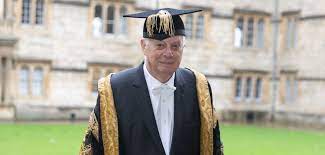By Gabriel Princewill-
The process of electing a new chancellor for Oxford University has ignited a fierce debate, with Chancellor of the Exchequer Rishi Sunak cautioning against measures that could restrict choice based on race, age, or gender.
The controversy surrounds a recent rule change that some fear could curtail the traditional democratic process in favour of considerations of equality and diversity.
For nearly two decades, Lord Patten of Barnes(pictured) has held the esteemed position of chancellor, but with his impending retirement, attention has turned to selecting his successor.
Historically, candidates could stand for election by alumni and staff if they secured nominations from 50 Oxford graduates or academics.
However, a recent alteration to the rules stipulates that an election committee will now vet nominees with regard to principles of equality and diversity. The variation to the rule was left ambiguous , without any clarity.
In the latest edition of the Oxford University Gazette, it has been announced that under new rules for the coming election, a small committee of academics and university administrators, including the vice-chancellor, will be able to choose who will go forward for election.
The committee will consider “the principles of equality and diversity and the approved role specification”, before deciding “which candidates are eligible to progress to the next stage of the election process,” the Gazette said.
Consideration of equality and diversity should naturally be deemed positive and welcome, but only if it is demonstrable that inequality and discrimination has characterised past selection processes.
The impetus of this latest transition which has taken many stakeholders by surprise remains largely unknown, though it suggests a lot cooking in the background.
Backclash
This shift has also triggered significant backlash, particularly from Conservative MPs who perceive it as a veiled attempt to prevent a white male professional, who could also be a politician, from assuming the role.
Concerns have been voiced about the process becoming less democratic and more akin to a closed selection by a small committee, raising fears of what is often described as a “woke” agenda influencing the outcome.
In a letter to The Times, a group of Tory MPs expressed apprehension about the move away from an electoral system, emphasizing that vague criteria around equality and diversity could undermine meritocracy.
They caution against following the path of other institutions that have faced challenges after prioritizing diversity over merit, citing the recent resignation of Harvard University President Claudine Gay amid allegations of plagiarism and criticisms of her appointment based on diversity considerations.
Some groups insist there are competent ethnic minorities with the professional wherewithal to occupy such top positions, but who are frozen out of the selection process.
Others point out that the potential knock on effect of an ethnic vice chancellor could be the pressure from lobbying groups to lower entry grades in order to accommodate some disadvantaged ethnic minority pupils in the name of ‘equality and diversity’, thereby weakening standards.
Yet, in the absence of openly identifying competent candidates not afforded an opportunity to blossom into the leaders they can be, the equality and diversity mantra may be inapplicable here.
‘It can be counterproductive because it could perpetuate the view that they only got the post outside of merit.
The debate highlights broader tensions surrounding diversity initiatives and their implications for academic institutions. While efforts to foster inclusivity are crucial, critics argue that such measures should not compromise the principles of meritocracy and academic excellence.
The role of chancellor at Oxford University, though largely ceremonial, carries significant symbolic importance.
It has been held by eminent figures throughout history, including former prime ministers and military leaders.
Responding to criticisms, a spokesperson for Chancellor Rishi Sunak stressed the importance of adhering to democratic processes and cautioned against divisive measures that could restrict candidate eligibility based on immutable characteristics.
.The Eye Of Media asked Oxford University if it had a list of credentials of potential applicants for the Vice Chancellor’s post, and what its precise framework for equality and diversity is.
At the time of publication, the university said our request was under consideration, but held up in a queue behind other waiting publications on the same matter.

